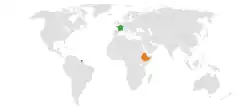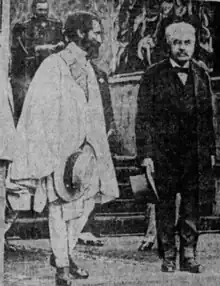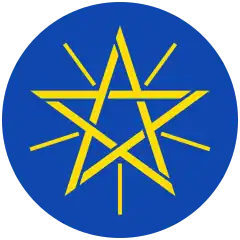 | |
Ethiopia |
France |
|---|---|
Ethiopia–France relations are the international relations between Ethiopia and France. Before World War II, France competed for influence over Ethiopia against the British and the Italians.[1]
Ethiopian Empire

In 1883, the French arrived in modern-day Djibouti and established a protectorate. The border between the French colony and Ethiopia would not be formalized until 1897.[2]
In 1902, Emperor Menelik II attended the coronation of Edward VII as the king of the United Kingdom and during his travel stayed in Paris, France where the government welcomed him.[3]
On 13 December 1906, the British, French, and Italians signed a Tripartite Treaty regarding economic activities in Ethiopia and also regulated the sale of weapons to the Ethiopians, which had before lacked any, with patrols in the Red Sea to enforce the weapon regulations. In 1920, the French attempted to have the weapons embargo lifted, but the Italians and British refused although the French would smuggle outdated weaponry through French Somaliland.[4] In 1930, the three countries signed another treaty regulating the sale of military equipment to Ethiopia.[5]
In 1907, Emperor Menelik II gave France its largest embassy in the world with 106 acres. In 1917, a railroad was built between Djibouti and Addis Ababa.[6]
During World War I, the Ethiopian Empire remained neutral, but made attempts to side with the Entente Powers which were stopped by the Italians.[2] In 1918, French Prime Minister Georges Clemenceau asked Italian Prime Minister Vittorio Emanuele Orlando on Selassie's behalf over the acceptance of 2,000 Ethiopian soldiers to fight in the war, but Orlando rejected the offer.[2]
On 28 September 1923, Ethiopia was accepted into the League of Nations.[3] Prince Regent Haile Selassie toured Europe, including France, to thank them for his country's inclusion and to learn about ways to modernize Ethiopia.[7] On 16 April 1924, Selassie and thirty nine people left Addis Ababa by train and arrived in Marseilles, France on 14 May. Two days later he arrived in Paris where he was met by President Alexandre Millerand and Prime Minister Raymond Poincaré.[3] During his tour in France he watched military training exercises in Versailles and gave medals to two tank crew members.[8]
Modern Ethiopia
In 2019, President Emmanuel Macron visited Ethiopia after plans for the French to send €100 million (ብር3,620,759,025.00) in economic aid to Ethiopia was made.[6]
See also
References
- ↑ "Anglo-Italian Division of Abyssinia Stirs Up France". Chicago Tribune. April 13, 1926. p. 16. Archived from the original on April 9, 2020 – via Newspapers.com.
- 1 2 3 Zollmann, Jakob (January 1, 2018). Ethiopia, International Law and the First World War. Considerations of Neutrality and Foreign Policy by the European Powers, 1840-1919. Corne de l'Afrique contemporaine / Contemporary Horn of Africa. Centre français des études éthiopiennes. ISBN 9791036523786.
- 1 2 3 "The Visit of Rās Tafari in Europe (1924): between Hopes of Independence and Colonial Realities". January 1, 2013. Archived from the original on April 14, 2020.
- ↑ Marcus, Harold G. (January 1, 1983). "The Embargo on Arms Sales to Ethiopia, 1916-1930". The International Journal of African Historical Studies. Boston University African Studies Center. 16 (2): 264. doi:10.2307/217788. JSTOR 217788.
- ↑ "Traffic In Arms In Abyssinia". The Guardian. August 22, 1930. p. 6. Archived from the original on April 9, 2020 – via Newspapers.com.
- 1 2 "Ethiopia, France sign military, navy deal, turn 'new page' in ties". March 12, 2019. Archived from the original on April 9, 2020.
- ↑ "France Does Highest Honor To The Dusky King Of Abyssinia". The Ottawa Citizen. May 16, 1924. p. 1. Archived from the original on April 9, 2020 – via Newspapers.com.
- ↑ "Regent of Abyssinia Visits Versailles". Hartford Courant. May 19, 1924. p. 4. Archived from the original on April 9, 2020 – via Newspapers.com.
